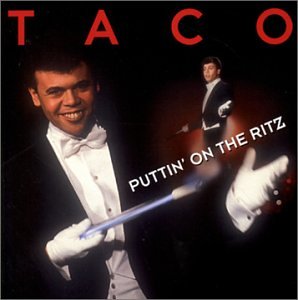Taco is not his stage name. His full name is Taco Ockerse. He was born in Indonesia, claims to be Dutch, and began his career in Germany. Didn't we all!
The lyrics in Taco's version are actually the second, revised lyrics. According to Wikipedia, "the original version of Berlin's song included references to the then-popular fad of flashily-dressed but poor black Harlemites parading up and down Lennox Avenue." Try this on for size:
Have you seen the well-to-doProgressive? Racist? I couldn't even begin to claim enough cultural context to tell you. Don't expect any analysis from Clark Gable:
Up on Lennox Avenue
On that famous thoroughfare
With their noses in the air
High hats and arrowed collars
White spats and fifteen dollars
Spending ev'ry dime
For a wonderful time
If you're blue and
You don't know where to go to
Why don't you go where Harlem sits
Puttin' on the Ritz
Spangled gowns upon the bevy of high browns
From down the levee
All misfits
Puttin' on the Ritz
That's where each and ev'ry Lulu-Belle goes
Ev'ry Thursday evening with her swell beaus
Rubbing elbows
Come with me and we'll attend
The jubilee, and see them spend
Their last two bits
Puttin' on the Ritz
Fifteen years later, "for the film Blue Skies (1946), where it was performed by Fred Astaire, Berlin revised the lyrics to apply to affluent whites strutting 'up and down Park Avenue'." Now it went like this:
Have you seen the well-to-doI can see Taco now: "Hmm, this song isn't bad, but you know what it really needs? Synthesizers." In his delicate hands, Berlin's Depression-era show tune got the Inspector Gadget treatment, complete with wobbly synth lines that would have been too cheap for a late night horror film, and creepy robotic backup singers hissing "Super-duper."
Up and down Park Avenue
On that famous thoroughfare
With their noses in the air
High hats and arrowed collars
Wide spats and lots of dollars
Spending every dime
For a wonderful time
If you're blue and you don't know
Where to go to, why don't you go
Where fashion sits
Puttin' on the Ritz
Different types, who wear a day coat
Pants with stripes, and cut away coat
Perfect fits
Puttin' on the Ritz
Dressed up like a million dollar trooper
Trying hard to look like Gary Cooper
Super-duper!
Come, let's mix where Rockerfellers
Walk with sticks, or umber-ellas
In their mitts
Puttin' on the Ritz
Then there is the video. Taco may have gone with the more politically correct lyrics, but he certainly didn't abandon political incorrectness:
The music video for Taco's version became controversial because of its blackface dancers. An edited version was released which replaces these dancers with a picture of Gary Cooper (except in the last part where the video zooms in focusing on Taco). In the instrumental dance part, it shows the feet of the blackfaced dancers and later places Taco dancing inset.Nothing like a little blackface to bring back that old timey feel. Here's the original clip:
Now here's the edited version [Edit: Looks like it's not on YouTube anymore]:
That is some impressive '80s editing my friends. I can almost see the conversation in the MTV break room now: "Bob ... I'm gonna need to you take this video, and, without filming any new footage, cut around all the shots of people in blackface - you know ... a little zoom here, some cropping there ... you can figure it out."
In the end, blackface may have been the least disturbing facet of this video. How about the homeless people surrounded by flames, the creepy mannequins, the glowing cane, or even the mouse? And then there is Taco himself, who has been compared in the YouTube comments to everyone from Tim Curry to "Booger" from Revenge of the Nerds. Here are some other winners:
He looks like that dummy who came to life in the twilight zone ventriloquist episode
He looks as weird as he sounds...the last two seconds of this video were particularly disturbing.
Best dressed Jedi ever.
I dont know bout all you guys...but this mother fucker looks creepy as fuck....especially when he does his little head motion after he says "coat perfect fits" .....dude creeps me the fuck out.
the video get weirder as it progresses
I preferred his earlier collaborations with enchilada.
Blackface is sexy.
As a Martian I am offended by the pianist's blatant racism of Greenface.
This song is on repeat in hell.
I enjoy this version because Taco is the physical manifestation of everything that fuels my nightmares.
All I can think of is a picture of Vladimir Putin's face on a ritz cracker.








